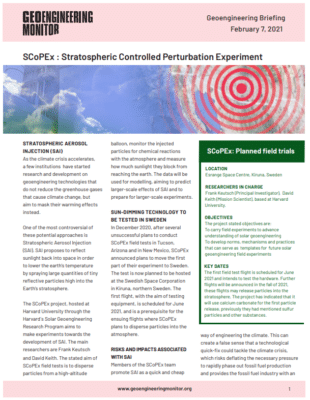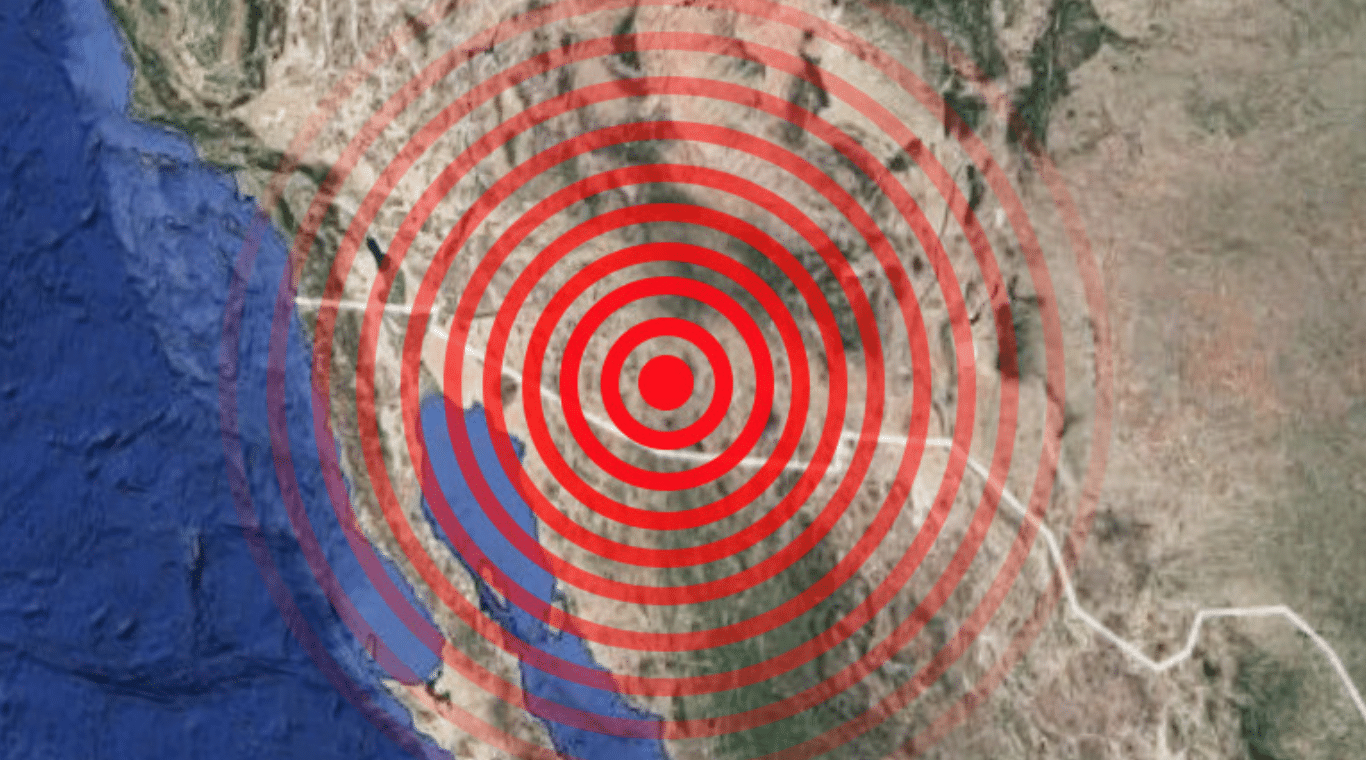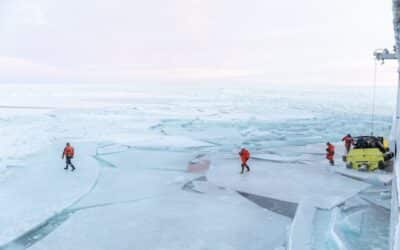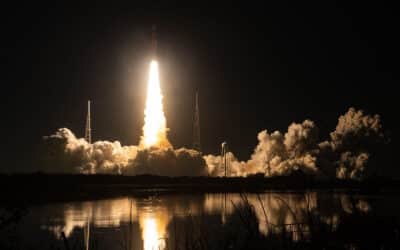Download PDF version: Sweden_SCoPEx_Briefing

Location:
Esrange Space Centre,
Kiruna, Sweden
Researchers in charge:
Frank Keutsch (Principal Investigator), David Keith (Mission Scientist), based at Harvard University.
Objectives
The project stated objectives are:
To carry field experiments to advance understanding of solar geoengineering
To develop norms, mechanisms and practices that can serve as templates for future solar geoengineering field experiments
Key Dates
The first field test flight is scheduled for June 2021 and intends to test the hardware. Further flights will be announced in the fall of 2021, these flights may release particles into the stratosphere. The project has indicated that it will use calcium carbonate for the first particle release, previously they had mentioned sulphur particles and other substances.
Stratospheric Aerosol Injection (SAI)
As the climate crisis accelerates, a few institutions have started research and development on geoengineering technologies that do not reduce the greenhouse gases that cause climate change, but aim to mask their warming effects instead.
One of the most controversial of these potential approaches is Stratospheric Aerosol Injection (SAI). SAI proposes to reflect sunlight back into space in order to lower the earth’s temperature by spraying large quantities of tiny reflective particles high into the Earth’s stratosphere.
The SCoPEx project, hosted at Harvard University through the Harvard´s Solar Geoengineering Research Program aims to make experiments towards the development of SAI. The main researchers are Frank Keutsch and David Keith. The stated aim of SCoPEx field tests is to disperse particles from a high-altitude balloon, monitor the injected particles for chemical reactions with the atmosphere and measure how much sunlight they block from reaching the earth. The data will be used for modelling, aiming to predict larger-scale effects of SAI and to prepare for larger-scale experiments.
Sun-dimming technology to be tested in Sweden
In December 2020, after several unsuccessful plans to conduct SCoPEx field tests in Tucson, Arizona and in New Mexico, SCoPEx announced plans to move the first part of their experiment to Sweden. The test is now planned to be hosted at the Swedish Space Corporation in Kiruna, northern Sweden. The first flight, with the aim of testing equipment, is scheduled for June 2021, and is a prerequisite for the ensuing flights where SCoPEx plans to disperse particles into the atmosphere.
Risks and impacts associated with SAI
Members of the SCoPEx team promote SAI as a quick and cheap way of engineering the climate. This can create a false sense that a technological quick-fix could tackle the climate crisis, which risks deflating the necessary pressure to rapidly phase out fossil fuel production and would provide the fossil fuel industry with an argument to delay action and thus worsen climate change.
Computer models and simulations suggest that SAI is likely to produce significant negative impacts and changes in weather and monsoon patterns, which would be disproportionately borne by the Global South and have particularly severe impacts on the world’s most vulnerable populations.
The major risks identified by those models include endangering the source of food and water for two billion people and causing severe droughts in Africa and Asia.1 Impacts would vary significantly by region and with in combination with the variable effects of climate change itself, even potentially devastating impacts might be difficult to detect until after significant damages have already occurred. Because of the unequal impacts among regions, SAI also has the potential to be weaponized.
Ocean acidification would continue to worsen since SAI masks the warming effects of CO2 but does not reduce the levels of CO2 in the atmosphere that cause ocean acidification. Depending on the reflective particles eventually deployed, the ozone layer could be at risk of being further damaged by SAI, which would undermine efforts to restore the ozone layer.
Challenges for governance
Due to the serious potential social, economic and environmenta impacts and the need to maintain its deployment over very long time, solar geoengineering carries insurmountable challenges for governance. Once started, the world would need to continuously release aerosols, likely for hundreds or even thousands of years, to maintain the cooling effects. Because SAI would only suppress temperature rise but not stop CO2 from building up in the atmosphere, if SAI were suddenly stopped it would cause a rapid temperature increase from all the built up CO2 – a “termination shock”, which would have hugely detrimental consequences for ecosystems and communities2. Stopping SAI once it has started could be more dangerous than starting it in the first place, locking the world into an irresolvable nightmare.
There is no justification to test a technology that poses such extensive risks while at the same time doing nothing to reduce the drivers of climate change and ocean acidification. Small scale open-air testing of SAI won´t provide information about the effects of SAI on climate, but would set the stage for additional, larger-scale testing of a technology that should never be deployed. Therefore, the most appropriate governance for solar geoengineering is a ban, in line with the precautionary principle. Based on this principle, 196 countries agreed to a de facto moratorium on geoengineering under the UN Convention on Biological Diversity in 2010. Noting the significant uncertainties and very serious risks associated with the technology, the Intergovernmental Panel on Climate Change did not include SAI in any of its modelled pathways for keeping earth below 1.5°.
SCoPEx Advisory Committee
In 2020, Harvard´s Solar Geoengineering Research Program established an Advisory Committee to advise on SCoPEx and to attempt to address contentious issues around their concept of geoengineering governance. The members of the advisory committee are exclusively U.S.-based and are primarily scientists and academics. Convening an advisory committee with members appointed by a small group of scientists selected by Harvard University officials related to the project is in no way a path towards multilateral democratic governance of SAI. And it is far from an inclusive, democratic, process with the communities and rights holders that would be affected by SAI.
Background information
SCoPEx was announced in 2015, launched in 2017, and is not the first attempt to conduct an outdoor trial in solar geoengineering at Harvard University. In 2012, David Keith announced plans to release particles from a balloon in New Mexico. The announcement came soon after a controversial proposed field test of another solar geoengineering scheme to test equipment for SAI – the British government-funded Stratospheric Particle Injection for Climate Engineering (SPICE) – was cancelled after a global outcry. The planned Harvard experiment in 2012 was cancelled too, but then revived in 2017.
Sources
1Robock, Alan, et al. (2010) A Test for Geoengineering? Science Magazine Volume 327 https://climate.envsci.rutgers.edu/pdf/TestForGeoengineeringScience2010.pdf
2Trisos, C.H,. et al (2018) Potentially dangerous consequences for biodiversity of solar geoengineering implementation and termination. Nature Ecology & Evolution 2, pp 475-482.
https://www.nature.com/articles/s41559-017-0431-0
Further reading
Raymond Pierrehumbert,(2019) There is no Plan B for Dealing with the Climate Crisis. In: Bulletin of the Atomic Scientists. Vol 75 issue 5. Published August 16, 2019. https://www.tandfonline.com/doi/full/10.1080/00963402.2019.1654255?scroll=top&needAccess=true
Heinrich Böll Foundation and ETC Group (2021) Geoengineering – Technology Briefing: Stratospheric Aerosol Injection (SAI), January 2021, https://www.geoengineeringmonitor.org/2021/02/stratospheric_aerosol_injection/
Biofuelwatch, ETC Group and Heinrich Böll Foundation (2018), The Big Bad Fix – The case against geoengineering
Media Coverage
Cohen (2021) A Bill Gates Venture Aims To Spray Dust Into The Atmosphere To Block The Sun. What Could Go Wrong?, in: Forbes, published: January 21, 2020, https://www.forbes.com/sites/arielcohen/2021/01/11/bill-gates-backed-climate-solution-gains-traction-but- concerns-linger/?sh=3194fa21793b
Doyle (2020) Planned Harvard balloon test in Sweden stirs solar geoengineering unease, in: Reuters, published: December 18, 2020, https://news.trust.org/ item/20201218140025-po1gu/
Fialka (2020) Pandemic Leads Geoengineering Experiment to Move from U.S. to Sweden, in Scientific American, published: December 17, 2020, https://www.scientificamerican.com/article/ pandemic-leads-geoengineering-experiment-to-move-from-u-s-to- sweden/
–February 2021 , info@etcgroup.org



